#characterisation
Text
Yes, your worldbuilding is thorough, your geography meticulous, your plotting elaborate, and your characterisation nuanced, but answer me this: is there a fucked up little guy?
14K notes
·
View notes
Text
When a character is assured enough in their own power that they are completely relaxed in dangerous situations??? When that same character becomes tense and uncomfortable in the mundane because they don't have a framework for peace?????? When they help navigate violence for another character and in return that character helps them navigate softness??????????? That's all, your honour
#tropes#character tropes#characterisation#writeblr#writing#what's that quote?#I am a weapon and weapons do not weep#yeah#I love angst
53K notes
·
View notes
Text
Super detailed character profile chart
Character Name:
First Name:
Last Name:
Nickname (if any):
Basic Information:
Age:
Gender:
Date of Birth:
Place of Birth:
Nationality:
Physical Appearance:
Height:
Weight:
Build:
Hair Color:
Eye Color:
Scars or distinguishing marks:
Personality Traits:
Positive Traits:
Negative Traits:
Background and History:
Family Background:
Parents:
Siblings (if any):
Childhood:
Education:
School/College/University:
Major/Area of Study:
Favorite Subjects:
Least Favorite Subjects:
Career/Profession:
Current Occupation:
Previous Jobs (if any):
Career Goals:
Hobbies and Interests:
Hobbies:
Interests:
Relationships:
Marital Status:
Romantic Relationships (if any):
Friendships:
Closest Friends:
Relationship dynamics:
Strengths and Weaknesses:
Strengths:
Weaknesses:
Goals and Ambitions:
Short-term Goals:
Long-term Goals:
Fears and Insecurities:
Common Fears:
Insecurities:
Quirks and Habits:
Quirks:
Habits:
Beliefs and Values:
Religious or Spiritual Beliefs:
Moral Code:
Political Views:
Favorites:
Favorite Foods:
Favorite Books:
Favorite Movies/TV Shows:
Favorite Music:
Favorite Color:
Dislikes:
Disliked Foods:
Disliked Activities:
Pet Peeves:
Miscellaneous:
Talents or Skills:
Secrets (if any):
Motivations:
What drives the character forward?
What are their ultimate aspirations?
Character Arc:
How does the character change or evolve throughout the story?
Feel free to adapt and expand upon this template!
#writing#writing inspiration#writing tips#writers on tumblr#creative writing#teen writer#writers block#story writing#writeblr#characterisation#character design#writing advice#character concept#character sheet
2K notes
·
View notes
Text
Fine then *changes my character design so that my hair that was previously tied back either to show youthful naivety or refined countenance is now hanging looser to signify the slackened grip I have on my emotions and moral compass* make me your villain
#tropes#writeblr#but also#this was inspired by wei wuxian's yiling patriarch look#wei wuxian#mdzs#character building#characterisation
6K notes
·
View notes
Text
Are your characters too “perfect”? Struggling to give them negative traits?
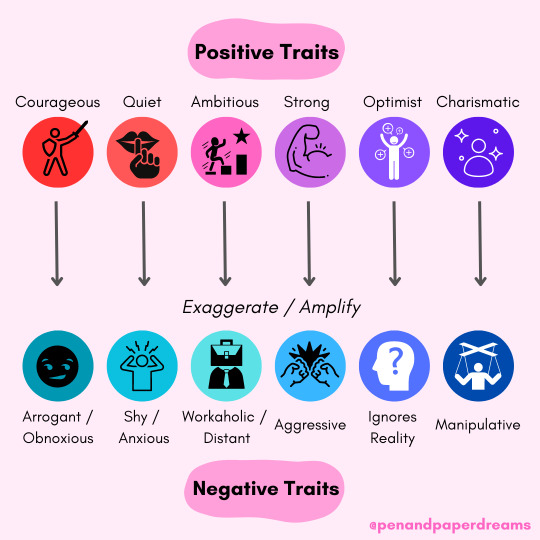
I’ve definitely fallen into the trap of making my protagonists and side characters too “perfect” before. It’s an easy mistake to make, but it can lead to your characters feeling one-dimensional if you’re too afraid to make them seem morally grey.
Here’s a very simple method:
1. Take a character’s main positive trait. Let’s take Hermione Granger, for example - her intelligence is a defining aspect of her character.
2. Exaggerate it into a negative trait. In the instance of Hermione Granger, she can come across to the other characters as a know-it-all. She’s not always portrayed as perfect for her intelligence, which is what makes her character more interesting.
Using this method, we have a number of options for negative traits for an intelligent character - patronising, arrogant, smug - to name a few.
I use the Fatal Attraction theory for this, which suggests that we fall out of love with someone for the same reason we were initially attracted to them. So, if you grew to like someone because you liked how strong and dominant they are, you may become tired of that down the line when their behaviour is controlling.
I’ve illustrated a few examples for how to exaggerate common positive traits into negative ones in the image above, but I have a few more examples to share so you really get the idea:
1. Comic relief / funny - can’t be serious, humour as a coping mechanism
2. Dark and mysterious - emotionally distant
3. Creative - aloof
4. Loyal - neglects own needs, willing to hurt for those they love
5. Compassionate / empathetic - overstepping boundaries
6. Honesty - overly blunt
7. Responsible - too serious
8. Humility - lack of self-belief
9. Trusting - easy to manipulate, overshares personal information
10. Perceptive - rude
11. Flirtatious - inappropriate
12. Organised - controlling, “neat freak”
13. Easygoing - lack of care about serious matters
14. Flamboyant - can be too much for some
15. Spontaneous - puts self in danger
Of course, you don’t have to do this. You can just have a character be spiritual and creative without making them out-of-touch and aloof. It’s completely up to you!
Using a method such as this, even if you only apply it subtly, adds a touch of realism to your writing by making your characters feel more well-rounded. It means that their negative aspects are truly coming from a part of them, rather than selected at random and mashed together from a list online.
#writing#writing tips#writing advice#character design#character building#character traits#characterisation#characterization#characters#personality#character personality#writingblr#novel#novel writing
722 notes
·
View notes
Note
You mentioned fanon turning barty crouch jr. into an uninteresting character. I don't know much about what the new fanon characterisation has really done with him, but I'm curious for your thoughts on why he's a canonically interesting character. I agree that he is, but it sounds like you might have some interesting thoughts on it that are already fleshed out.
thank you for the ask, @jamesunderwater, and i'm sorry for taking so long to drag myself around to answering this.
as you may have gathered if you’ve read my views on jegulus or wolfstar, the common fanon interpretation of marauders-era characters and i don’t really get on.
this is not a new development - me and goofy fanon sirius have been beefing for over a decade at this point, i fear - but our enmity has taken on a new form since (roughly) 2020, when the emergence of what we might call the modern marauders subfandom brought with it a whole series of expectations about characters, ships, personalities, and appearances in first war stories which, let me state my position immediately, have absolutely nothing to do with the characters as they are in canon.
i could talk about sirius or regulus or james or snape or lupin until the cows come home - as, i’m sure, could many of us - but i also dislike the expectations the marauders subfandom has around its supporting cast. these characters - who largely fall under the categories of women, slytherins, or both - have names that we might recognise from canon, but they are - to all intents and purposes - original characters.
to do some marauders fan defending, i do understand the rationale behind this. hogwarts is a school, and it needs to be filled with the sort of incidental characters that lightning-era writers can pull from the canon text (shoutout to ernie macmillan, the mvp). if you’re writing about lily, then she needs friends - why not have them be alice, marlene, dorcas, emmeline, pandora etc.?
[well, because dumbledore isn’t running a child army. it makes no sense for the entire order of the phoenix to be in the same school year - and the idea that alice is probably around ten years older than lily, that pandora is around the same age as narcissa malfoy and isn’t a pureblood, and that marlene, dorcas, and emmeline are hard-nosed ministry bitches in their fifties who can have mad-eye moody quaking with just a look is something which can be prised from my cold, dead hands.]
and if you’re writing about the epic highs and lows of high-school football going to school during a sectarian conflict, then you need some antagonists. which is to say, you need some slytherins.
the issue i have is that the three key slytherins who seem to have been elevated to principal cast in the marauders pantheon - regulus black, barty crouch jr., and evan rosier - get what can only be called the smol bean treatment. that is, that three teenagers who all canonically join a terror organisation are turned into soft and tiny babies who thought lord voldemort was just feeling silly when he said, ‘my aim is the eradication of the muggleborn population through violent means.’
and even fics which do acknowledge that the three willingly become terrorists often go out of their way to provide justifications for this which don’t contextualise their decision (something which is important - you can’t write about snape becoming a death eater without acknowledging the way that poverty, loneliness, and a sense of hopelessness make someone an easy target of radicalisation) but which minimise it. sometimes, their violence is turned into romantic vengeance - i’ve seen a fair amount of suggestions that barty goes to torture the longbottoms because frank was the auror who killed evan. sometimes, authors imply - or even outright state - that there’s no need to see these boys as aspiring villains: voldemort is right; the class system is good and should be maintained; and purebloods (usually james, sirius, regulus, barty, evan and maybe a token woman or two) should stick together while the half-breeds and the mudbloods go hang.
this - like all aristocracy wank in this fandom - annoys me enough with regulus and evan. but it’s particularly grating when it comes to barty crouch jr. because - unlike evan, who is literally just a name in the text, and regulus, who isn’t much more - he actually has a canon personality.
and it’s fascinating. indeed, i would even go so far as to say that barty crouch jr. is the greatest villain in the harry potter series.
[my apologies to lord voldemort.]
after all, even though he’s been imprisoned under the imperius curse for over a decade, barty is still so lucid and powerful that he is able to:
produce magic capable of tricking the goblet of fire, which is treated by all the adult characters involved as unprecedented.
pull off a year-long impersonation of a man whom dumbledore evidently knows extremely well without being clocked until his mission has been successful, even though his opportunities to observe the real moody can have been virtually non-existent. he is in character within seconds of his ambush on moody’s home - after the intruder-alert dustbins are set off - and is able to persuade ministry personnel who can be presumed to have met moody personally (including both amos diggory and arthur weasley, who appear to know him not only personally, but well) that he is the real deal. he maintains his performance even under close scrutiny from the teaching colleagues he has to interact with daily at hogwarts, despite the fact that he presumably can’t get a great deal out of the real moody, since he’s having to be kept deliberately weak and docile under the imperius curse.
manipulate multiple people into become accessories to his crimes, without ever being suspected of doing so. with the hindsight of knowing who he is, the first defence against the dark arts lesson in goblet of fire, in which ‘moody’ deliberately distresses neville by using the cruciatus curse directly in front of him, before swooping in to be the person to cheer him up so that he can plant information which will help harry win the triwizard tournament and deliver him to voldemort, is chilling. he just gets unlucky that harry has the biggest martyr complex in human history.
commit murder on hogwarts’ grounds without ever being suspected of wrongdoing.
execute lord voldemort’s plan to kidnap harry and use him in his resurrection ritual flawlessly. the plan itself may be convoluted - but dark lords are allowed to have a flair for the dramatic, as a treat - but, crucially, it works, and barty succeeds in every respect.
but, i concede, we’re talking about the adult barty here. perhaps he was once a sweetheart who went unfortunately off the rails after his father sent him to prison and then - in effect - drugged him for years. that wouldn’t be a ridiculous suggestion.
except for the fact that - canonically - the teen barty was just as clever, sly, manipulative, and - above all - ardent in his support for voldemort as his adult self.
at his trial in the early 1980s, young barty gives the performance of a lifetime. he screams, he shakes, he looks terrified of the dementors, he is pale and weak and harmless-looking, he begs his mother to help him, he pleads with his father for mercy, he maintains his innocence as he is dragged off to his cell. he gives off the impression of simply having been in the wrong place at the wrong time so well that harry potter is almost certain that his conviction is illegitimate. so too, it is implied, is albus dumbledore.
indeed, barty plays the part of the wrongfully imprisoned so well that - as canon tells us - he not only influences public opinion to be broadly in favour of his probable innocence (or, at least, his diminished culpability - sirius suggests that the widespread view was that he was probably there, but that he only ended up involved in what was clearly bellatrix’s idea because of his father’s failure to relate to him properly), but also changes public opinion against the government’s anti-death-eater strategy entirely. following his imprisonment, his father - a man who never met an extrajudicial punishment he didn’t like, and whose ruthless approach to dealing with the death eaters in the first war (such as his use of internment for suspected terrorists, his order to aurors to shoot to kill) was, we are told, enormously popular with the wizarding public - is forced to resign in disgrace from his role as head of the department of magical law enforcement. crouch sr. is quietly shuffled off into a boring bureaucratic position, his ambitions to be minister in tatters, and his only way forward to free his son from the prison cell where he is languishing for the crime he very literally did.
[as an aside, i do think that we are supposed to read that bellatrix is the ringleader of the torture of the longbottoms. but, all too often, that gets reduced to her doing everything while rodolphus, rabastan, and barty just stand there gormlessly. they were clearly performing the curses too!]
now, barty’s unusual cunning can - of course - be explained by narrative reasons. the text needs to conceal that he’s the villain (since, as with philosopher’s stone, it wants to imply that the dark lord’s faithful servant at hogwarts is severus snape) until the very end - and this naturally requires dumbledore to not think too hard about whether his good judy alastor is behaving even more strangely than usual.
the text also needs to suggest that he is innocent in order to properly stick the landing on the narrative role of his father - barty crouch sr. as with dolores umbridge in order of the phoenix, crouch sr. exists to show harry (and the reader) that the rot in the wizarding world was not caused by - and will not stop with the defeat of - voldemort. his ruthlessness and inflexibility, his lack of respect for due process, his astonishingly cruel treatment of winky (brutal beyond even the standard way in which wizards abuse their enslaved elves) all serve to teach harry that the anti-voldemort cause can become just as easily corrupted as the disillusioned young men in voldemort’s orbit. the suggestion that crouch sent his own son to azkaban without good reason, simply because he would not deviate from his beliefs, is an important lesson to harry about what ‘justice’ actually means.
but, despite this, barty is also able to pull off his deception because he’s spectacularly talented. it’s not all just narrative.
and his talents are caused by characteristics which aren’t good or bad in and of themselves. he’s clearly very intelligent (he got twelve owls, the series’ benchmark for genius). he’s hyper-observant, creative, adaptable, good under pressure, and possessed of nerves of steel. he shares these traits with other villains in the series - voldemort above all - but he also shares them with plenty of the heroes. harry, for one.
which is to say that all of his personality traits could be put to non-criminal uses. but - as with harry, who is capable of being quite sinister when he wants to be (for example, when he manipulates slughorn into giving up the horcrux memory) - they would give a non-criminal barty an edge. and this doesn’t seem to be present in his standard fanon persona - as sweet and goofy as all marauders-era men - to any great extent.
finally, there is another aspect of barty’s character which is absent from his fanon version - that he clearly has some sort of childhood trauma, but that this does not excuse any of what he does.
even though crouch sr. is right to send him to azkaban, he was clearly also a cold and distant father, who had absolutely no idea how to relate to his son.
[as another aside, this emotional negligence is bad enough without it needing to be written as having been accompanied by extreme physical and/or sexual abuse. there seems to be a real tendency in fan-fiction - not only in marauders-era stuff, although the exaggeration of orion and walburga black into despotic villains is one example of this - to make childhood misery ‘worse’, in order to justify a character’s later actions.]
voldemort demonstrably uses barty’s terrible relationship with crouch sr. (and his absolutely flagrant daddy kink) to groom him into taking the dark mark (not least because there’s otherwise no explanation for why he cheerfully informs him that he too is named after his dad), which he may very well end up taking when he’s still at school. my reading is that he’s recruited to inform on his father - since voldemort would undoubtedly wish to keep the head of the department of magical law enforcement under constant surveillance - and that this is why the dark lord pays him the attention he is so obviously lacking.
but, as with snape and regulus and draco malfoy and all the other young death eaters, barty also colludes in his own radicalisation. voldemort is a master at ensnaring recruits, sure, but he’s also a busy man. he only bothers to make the effort because the clever, creative, cunning, manipulative young man - who wishes to avenge himself on the father who never paid him attention (sound familiar?) - he finds before him is very much determined to become a spectacular part of his terrorist organisation. and stories which feature him owe it to him to give him that dark complexity of character
show the series’ best villain some respect.
198 notes
·
View notes
Text
some people’s interpretation of dean’s character as this dumb guy ruled only by his animal brain instincts, incapable of complex thinking, who can’t understand his own emotions let alone others’ and lashes out by being an asshole to everyone and can’t be alone with his thoughts and has to have his own emotions or any intelligent thought really, patronisingly explained to him by his superiorly educated brother or someone else is so so frustrating and insulting. not only is that the furthest thing from his character but it’s always a biased portrayal meant to shine the spotlight on their fave and to show that dean is somehow inherently inferior to them. none of you people know who he is or even who sam is honestly. it just doesn’t sit right with me and it feels like it’s rooted in classism.
#atp just invent your own characters#supernatural#dean winchester#sam and dean#characterisation#spn fandom#.txt
153 notes
·
View notes
Text
Characterization
Bilingual Characters
Note: I am not bilingual, so please add or correct me if you can. This is what I have observed/learned from friends who are.
❃
➸ forgetting terms in [language A] and trying to explain with context clues or hand gestures ; it’s common to forget terms even in their primary language, not just a secondary one
➸ usually it’s just repeating “the thing” while trying to remember the term or using a synonym even if it doesn’t make as much sense
➸ inner dialogue switching between languages depending on connotation of thought and which language they have been conversing in lately
➸ counting in [language A] and then translating the final number into [language B] because it’s easier that way
➸ translating slang terms from [language A] that do not actually translate with the same meaning or make sense in [language B]
➸ speaking with grammar rules from [language A] that are incorrect in [language B]
➸ asking non-bilingual person if there’s a translation for a word before realizing they would have no idea
➸ never say something like “oops, it’s hard to switch back sometimes” — that’s lazy writing and doesn’t happen in real life
➸ language is a conscious action so when speaking [language A] people aren’t just going to throw in words from [language B] unless they are struggling to find a translation and then that struggle will be obvious
➸ if a character throws in a word from [language A] while conversing in [language B] it’s on purpose, usually because they’re messing with the other person or the word in [language B] doesn’t have the same connotation
➸ for example, curse words, nicknames, or other exclamations from [language A] may commonly be thrown in while conversing in [language B] but it is purposeful
➸ the only exception could be children who grew up bilingual; they may genuinely combine languages without thinking about it
➸ switching between languages may take a second for their brain to compute, even if they’re switching back to their primary language ; especially if they’ve been using one language consistently for a while
➸ when in an adrenaline-rush situation (like being panicked or in pain) a person will usually fall into their first language
➸ don’t try to transcribe accents — if your character has one, describe it and move on ; messing with dialogue too much will confuse readers
➸ there are different kinds of bilingual: fully (speak, read, and write), conversational (speaks fluently but does not read/write as well; this is common with immigrants), and comprehensible (can understand what someone says to them, but struggles to speak back; common with those who took school classes)
➸ people who grew up speaking primarily [language A] will commonly get anxious conversing in [language B] even if they are fluently bilingual ; this is something people can overcome with time
➸ when researching a language you do not speak but your character does, make sure to understand the culture too because it will influence how they speak
➸ culture affects expressions, idioms, forms, even basic vocabulary — you’ll need to understand this because every language breaks formal rules while in casual conversation & using this will make your character more realistic
➸ find a bilingual beta reader!
#writing#writing tips#story ideas#reference#characterisation#fantasy#knowledge#characteristics#character#character traits#writing characters#writing reference#writing fiction#character design#character development#bilingual#bilingual characters
2K notes
·
View notes
Text
It's endlessly fascinating to me that Robin in s3 is so convinced of Steve's douchery but her only examples are that he didn't talk to her (a girl in a different grade with no friends or activities in common who never spoke to him) and the fact he ate bagels in a way that annoyed her.
This isn't a criticism of Robin as a character (its super on brand for her) but it does raise far more questions about Steve’s high school actions and character than it answered. This was an outsider to the main narrative giving a perspective on Steve and so it surely should set the tone for the bully he has been working on reforming himself from, right? That’s his character arc… right?
Then why instead a story where Steve caused anyone harm is this a story about Steve minding his own business while a girl he’s never spoken to, who he shared one class ever with, blames him for the fact her straight crush isn’t interested in her? There are a million ways to demonstrate that Steve was privileged or self-centred or dismissive but this story didn’t really do that.
Which means that we’ve never really SEEN this version of Steve that apparently his ENTIRE CHARACTER ARC is about him growing away from. It’s just mentioned in passing.
I know what you’re thinking, “what about season one!?” But what did we see in season one? Steve has like two friends apparently? Maybe three if we count that Nicole girl who appeared for two seconds. His lunch table seems more gossipy than aggressive until the interactions with Jonathan, which started off as mostly Tommy until Jonathan took deeply creepy pictures in Steve’s bedroom window and he had a pretty normal reaction to that.
The worst of Steve that we see if while he think Nancy is cheating on him with Jonathan and he allows Tommy and Carol to talk him into the cinema thing and then provokes Jonathan into the fight in the alley. But this is a really specific set of events that it is unlikely has ever happened like that before. Also Steve doesn’t bring a gang of guys to jump Jonathan, he talks shit until Jonathan swings first and only with an audience of Tommy. Within like an hour of the fight, Steve already regrets it and goes over to a guy he doesn’t like, who just beat the shit out of him’s house to apologise.
So season 1 Steve is selfish, gossipy and shallow – sure. We see his obsession with being like and seeming normal (the thing he is least able to shake in future seasons) but we don’t see him antagonistic towards anyone. If his terrible past as high school asshole / bully was going to be central to his character arc… shouldn’t we see it somewhere?
246 notes
·
View notes
Text
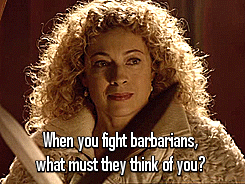
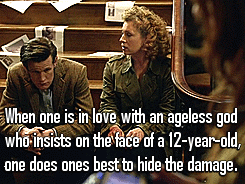
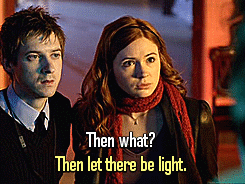
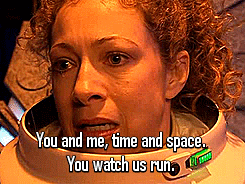
...Berlin on the eve of war. A whole world about to tear itself apart...
. . . What if we had ideas that could think for themselves? What if one day our dreams no longer needed us? . . .
...This was exactly you. All this. All of it. You make them so afraid...
. . . Like I said on the dance floor, you might want to find something to hang on to . . .
...When you love the Doctor, it's like loving the stars themselves. You don't expect a sunset to admire you back...
@riversongsource river song appreciation week: day 4, favourite trait
eloquence
153 notes
·
View notes
Text
Erazon's Characterisation Essay (Part 1 - Cynthia Edition)
General preface; This is me snowballing on a thought I had earlier about canon v fanon trends given that it's a pretty evergreen topic. Without getting too much into the subject itself, I made the point that you can use the source material as a starting point for analysing characterisation, but in a lot of cases it's highly interpretive; using Pokemon as an example, most of the non-player characters exist to enable the player's autonomy throughout the game's storyline, and only a small handful have their own detailed arcs and backstories.
Therefore if you want to build on characterisation for them for transformative fanworks, you only have a handful of dialogue lines and some environmental storytelling that borders on olympic levels of mental gymnastics. Things like backstory and character motivation needs to be invented, to which end the concept of 'canon' characterisation becomes pretty insignificant in comparison to the story you are trying to tell, and whether or not that characterisation is thematically appropriate and compelling. Everyone is going to have a subjective opinion about the 'essence' of a character, the core traits that make them who they are, and how integral those traits are for it to be a 'canon' or 'fanon' interpretation.
And yet there's still ways to analyse the games to draw some conclusions that aren't always obvious straight away.
I'm going to go into how I draw characterisation for Cynthia for Way Out, but keep in mind that I don't consider my characterisation perfect or the One True Depiction To End All Others etc and so on and so forth. There's things I need to discard in favour of the story– adults in the Pokemon games, including Cynthia, have a pretty laissez-faire attitude when it comes to kids handling crises so that the target audience (kids) can feel acutalised as they play through the story, but it's not always what I consider a core character trait so much as a function of the medium.
I play up a sense of responsibility and duty that isn't really depicted in the games but is nevertheless an easy takeaway in order to give her character a bit more depth and relateability. And when other people take her character in a different direction, I try to keep an open mind about what they're saying about her character in their story, because their story is not a video game for children nor a webcomic, and they will need to do different things depending on her narrative role.
(I don't have to like it, but I'm no less a subjective soul than anyone else).
I also pull here and there from other sources of inspiration, one I've mentioned before is a meta-analysis of how she's treated by the fandom in general, assuming she'd be treated a similar way as a public figure in-universe. A lot of my character work is about peeling back that legendary status and asking who the person underneath is and how she might deal with the pressures of being expected to consistently meet other people's high standards, and how to balance a healthy competitive streak without it becoming toxic.
But more to the point– here's some material exclusively from Platinum that I think collates to a pretty consistent depiction of her character, to keep in mind and interpret any which way, arranged into some key traits.
She is the granddaughter of a village elder in a traditional rural town.
"My grandma has this sort of bossy atmosphere about her. I think you'll recognize her right away. Yes, I'm sure you will. She's the elder of Celestic Town"
An overlooked aspect of her character that I think holds some of the ripest potential for her character is that we know a fair deal about where her family is from, potentially where she was raised. My personal conclusions are:
It is likely she has an ingrained sense of cultural values of humility, respect, duty, and tradition. While she may not be ruled by these traits, they would influence the way she interacts with the world.
Her interest in mythology is likely inspired the mural in Celestic town, and reflects a value of heritage and history.
It's a common 'fanon' that her grandmother was her primary guardian through much of her childhood, which isn't substantiated anywhere (just because we don't meet her parents as NPCs doesn't mean they don't exist) but this idea strengthens the connection she has to Celestic town and emphasises her position as the elder's heir.
Cynthia introducing herself as a trainer and not a Champion suggests humility; she positions herself as an equal to the player as opposed to a superior.
2. She is earnest and sincere
"...The places we are born. The time we spend living... The languages we speak... We are all different. But the presence of Pokémon unites us. We share our lives with our Pokémon and our happiness grows as we all become greater than we were alone. That is why we can battle and trade with anyone we choose..."
This is a reflection of her position as a narrative foil to Cyrus; where he dismisses the importance of emotion and 'spirit', she holds it in high regard. Thus;
She sees strong emotions as the source of her bond to her Pokemon and therefore the source of her success. While it's not to say she's an overly empathetic person, I think it follows easily that is generally emotionally intelligent (generally).
I think she's self-aware about how emotional she can be too, which is to say it's something she consciously embraces despite knowing she comes across a little overly earnest (and cheesy) sometimes.
"I love the sound a piano makes. I savor every note with my entire being. It's not only my ears; my spirit hears the music it makes... Ehehe, I made myself cringe saying that."
3. She is intelligent
"I think I let myself get carried away and talked for far too long. I'm sorry, and thank you"
This feels like a no brainer (ha) but it's also easy to take someone who comes across as emotional and write them off as being illogical or not having the depth for complex thought. To me, her emotional intelligence goes hand in hand with her analytical intelligence.
Her fascination with mythology is one of her defining traits, and her dialogue is the source of much of the lore surrounding the Sinnoh legendary Pokemon.
Her pursuit of knowledge is one of her defining traits; her interest in mythology and the distant past is referenced more frequently by herself and other NPCs than the fact of her being Champion. "My big sister is studying the myths of Sinnoh. She wants to know how people and Pokemon interacted in the days of myths."
As a Champion, I consider that she's very calculating and analytical. Even without the strategic held items given to her in BDSP, her Pokemon have perfect stats and have solid type coverage. It's not something she would accidentally stumble onto.
"When you are facing a Trainer in battle, you can learn everything about them. What Pokemon they have. What moves they've taught. What items they make Pokemon hold."
4. She is kind
"I want you to keep traveling to many far-off places. I want you to keep meeting all kinds of people and Pokémon. I came all the way here just so I could say that to you!"
A Champion in this game being kind isn't really a revolutionary idea, but it's still something I consider very integral, particularly in conjunction with the prior traits; there is diplomacy and there is compassion, and to me Cynthia balances both.
She is something of a mentor figure to the player, giving them the solution to obstacles on multiple occasissions (HM Cut, the Secret Medicine), and imparts a lot of lore to them. Notably she gives them an egg which hatches into a Togepi; while this event doesn't happen in BDSP and Platinum doesn't have the Fairy type, it's still retroactively made more interesting for the fact that Togekiss' modern Fairy/Flying type grants perfect immunity to her Garchomp's Dragon/Ground typing.
Some of the few interactions the player will have with her is giving medicine to the Psyduck blocking the route to Celestic town, and then delivering a charm to her grandmother– it gives an impression that she is regularly invested in small acts of kindness.
5. Other tidbits
Every time she interacts with you as the player, it is always through the lens of an adult with a public position speaking to a child; I take it as a given that all her interactions have a slight amount of professional distance, and a formality she wouldn't have if speaking to an adult friend.
She reveals that she went on a similar journey as the player character after being given a Pokedex by Professor Rowan, which could imply she experienced similar experiences to the established protagonist journey formula.
There's a slight goofiness to some of her dialogue that suggests she doesn't always take herself too seriously. "You've seen that group of Psyduck huddled with their heads in their, uh, hands...?"
It's a pretty common 'fanon' for Cynthia to have known Cyrus in her childhood, but this isn't really substantiated in text; her dialogue towards him would be a lot colder with that context as opposed to a stranger. It's a common headcanon because giving them a history together strengthens their position as foils, but in my opinion it's equally as interesting that Cyrus succeeds as far as he does because he exists in Cynthia's blind spot- she admits she didn't pay enough attention to what Team Galactic was up to, and can only stand in opposition to him ideologically, unwilling to entertain (or empathise with) his perspective. It hints at a certain stubbornness she has when she believes she's right and someone else is wrong.
This is just what I personally glean from the text; it's possible I've missed something that somebody else considers ultimately integral. But I hope that my writing in Way Out speaks for itself in how I apply all this to her character in the story, and why I feel it's important to do so. Cynthia is the character I second-guess the most in her characterisation because she should always be recognisable, even while going through different arcs. Her values, her intelligence, her sincerity, and her kindness are all things that need to be balanced with the needs of the story; how strong she is is just a relative thing to what any particular scene demands.
There's a lot I could still elaborate on but for the sake of at least attempting to keep this (relatively) concise, I wrote all this to highlight how I try to stay on track with consistent characterisation, which may not be the perfect ideal for this character but nevertheless is the best version for my story. There's nobody I hold to a higher writing standard than myself, and I try to constantly ask myself if I'm really writing what's best for the narrative or if I can do something better. I'm not interested in the most canon depiction that exists for another story, I'm interested in what's right for my story.
And uhhhh peace ✌️
#long post#like long long#it's a whole read#but if you like reading do i have good news for you#pokemon#cynthia#characterisation#tangential enough to way out that i can tag it#way out#im also open to discussions about this because it's just my ~opinion~ and again i like to keep an open mind
31 notes
·
View notes
Text
The problem with Victor Frankenstein isn't that he's not as smart as he thinks he is. The problem with Victor Frankenstein is that he's exactly as smart as he thinks he is in one very specific area, and he just expects that to automatically translate to every other area of his life and is taken completely by surprise every single time it doesn't.
#media#literature#frankenstein#victor frankenstein#mary shelley#characterisation#he's the forefather of every stem influencer who thinks having a phd in physics automatically makes them a qualified sociologist
9K notes
·
View notes
Text
We all know and love the final girl, but I want to know more about the first girl. The forgotten girl. The unlucky catalyst. The girl who's buried twice, first to be killed and last to be avenged. The girl that everyone else thinks about, when that phone call comes, when the backdoor is mysteriously unlocked, when the blade slides home. But she had no one before her to provide context. She was all alone with her fear and she died without knowing that her brutal sacrifice would birth the creation of a final girl who lives. The girl who watches as the girls after struggle and fail again and again until finally, finally, she wins but it's bittersweet because she had a whole lineage of dead girls to guide her way and the first girl had nothing. She was always supposed to fail and she did it so beautifully they've changed the meaning of her name about it, she is no longer a person she's that first brutal death.
#horror#I think about Barb a lot#from stranger things#and how in horror movies the first girl is always a test#a sound check before the final girl gets her moment#tag talking#characterisation#final girl#writeblr#marrow writes#tw murder mention#tw death
7K notes
·
View notes
Text
Hi guys!!
What do y’all generally think about the adult gaang in tlok? Cause personally i really cannot connect the gaang in atla to their characters in tlok, they just do not seem like themselves,,
#atla#atla zuko#avatar the last airbender#atla aang#zuko#avatar: the last airbender#the legend of korra#atla sokka#sokka#atla toph#toph beifong#atla katara#katara#avatar aang#characterisation
29 notes
·
View notes
Text
How to write morally grey characters
By WriteAway on Servicescape
Morally ambiguous characters are those that are not simply heroes or villains. They fall somewhere in between, and as such, add a layer of depth and complexity to your story. The truth is that most humans in real life are not pure angels or simply bad people, but rather hold elements of both. Morally ambiguous characters can drive the plot in interesting ways, allow for great character growth, and sometimes end up being some of the most memorable characters in a book.
Morally ambiguous characters can start off with good intentions and then be driven to evil by others or by society, or they can start off evil and come to redeem themselves. Alternatively, they can remain ambiguous and complex throughout the whole narrative, and leave the reader to make up their own mind about them. Either way, these characters certainly make us think about the nature of good and evil and the complexity of the human psyche.
Give them a backstory
Understanding where they came from is important for any character, but it's particularly crucial when your characters are morally ambiguous. Often, the struggles the character went through in the past go some way to explaining their negative character traits now, or at least make us empathise with them a little.
The backstory is important for character development, and it is a great place to explore ideas of personal responsibility vs critiques of society and the results of terrible experiences. Whether your character was bullied as a child, pushed to the margins of society, or something else entirely, give them a rich background that helps us understand why they act the way they do.
Understand their motives
All characters should have needs and desires, and reasons they do the things they do. Often, when it comes to morally ambiguous characters, their motive is exactly what causes them to slip up and do morally questionable, cruel, or destructive things. This can be true whether or not the motive is itself a good one or not.
A morally ambiguous character can be a wonderful opportunity to explore the idea that the ends justify the means, and the corrupting force of power. Whether your character's motives are good but lead them to terrible actions, or whether it is precisely the selfishness of the motives that lead to your character's downfall, give them goals and desires that force them (and the reader) to grapple with choices and dilemmas. And the motives don't have to be as dramatic as the ones mentioned – as with Jay Gatsby in The Great Gatsby, it can be something as simple as a desire to win back a lover that leads a character into moral ambiguity.
Give them a weakness
Going all the way back to ancient Greek tragedies, the idea of the hero with a fatal flaw has lived on in literature for thousands of years. A morally ambiguous character may be fundamentally good, but marred by a particular weakness, such as cowardice, vanity, shame, or anger. The characters in F. Scott Fitzgerald's The Great Gatsby are full of fatal flaws. For Daisy Buchanan it is her vanity and desire for wealth and admiration. For Jay Gatsby it is his love for Daisy, as well as his shame surrounding his background.
Your character's weakness doesn't have to be the ultimate cause of their downfall or even their central character trait. The main point is that they have certain elements in their nature that challenge them, tempt them, or cause them to struggle. It doesn't matter what they are, but weaknesses make morally ambiguous characters more believable, layered, and human.
Give them redeeming qualities
This goes without saying, but you can't have a morally ambiguous character without giving them some redeeming qualities. Whether they are primarily good but are driven or tempted to wicked acts, or whether they are basically villains with good motives or elements of kindness, there needs to be some level of balance.
Severus Snape is often cruel and sometimes corrupt, but he ultimately makes the right choices where it matters. The Artful Dodger is a thief and ultimately betrays Oliver in Charles Dickens' Oliver Twist, but he also helps Oliver and displays feelings of sympathy towards him. Moreover, his actions can be understood in light of his circumstances and experiences.
In the end, it doesn't matter where your character falls on the scale of morality. The important thing is that they have a believable and interesting combination of motives, flaws, and redeeming qualities. If you can get these elements right, you will have yourself a really fascinating, morally ambiguous character.
Let them grow and change
Character arcs are essential to good storytelling. No character should be exactly the same at the end of a book as they were at the beginning. The mechanics of plot are important but are ultimately meaningless if they don't cause development on the part of the characters. However, when it comes to morally gray characters, the way they change throughout the narrative is particularly important.
George R. R. Martin is a master of the character arc. Both of the Lannister brothers are not presented as particularly praiseworthy at the beginning of the series. Tyrion, while harmless, is shown to be philandering, selfish, and lazy. Jaime Lannister, on the other hand, is an outright villain, as he pushes a young boy out of a high window just to protect the reputation of him and his sister. Both go through redeeming character arcs, with Tyrion becoming a paragon of thoughtful justice with a commitment to seeing good prevail. Jaime has perhaps the most striking redemptive arc of the series, but his love for his sister is the fatal flaw that spells disaster in the end.
Many supervillains and other characters experience the opposite type of character arc. In the recent Joker movie, we observe the Joker not as a simple villain, but as someone who was pushed to evil from his experiences and the cruelty he suffered at the hands of society. He begins as a sympathetic character, but by the end he is without question a villain. However, it need not be as black and white as this. Jay Gatsby's weaknesses certainly lead to his downfall, but it is up to your interpretation whether he is ultimately a tragic character or someone who has received his comeuppance.
As we can see, a character arc need not be simple or go only in one direction. Your character can struggle continuously with moral questions, leaving the reader unsure up until the finale what side they will end up on. You can end your book and leave it ambiguous whether the character was ultimately good or evil, or perhaps a very human combination of the too. The main point is that the experiences they have and the actions they undertake throughout the novel must affect them in some way, so that they develop as a character.
Keep the readers guessing
The previous point touches on this, but one way you can keep readers fascinated throughout the whole book is to keep them guessing about the true moral nature of the character and what they will do next. Severus Snape is a prime example of this. We as readers are left unsure right up until the end of the series whether his loyalties lie with the Death Eaters or with the Order of the Phoenix and those fighting Voldemort. In fact, people still argue about whether Snape really redeemed himself enough to be the namesake of one of Harry's sons or not. If your character causes arguments, you have done something right!
There are multiple literary devices you could use to keep your readers guessing. You could pepper little hints throughout the narrative that show the possibility of redemption or allude to potential disaster. Instead of revealing what the character is thinking, you could merely show us their actions, leaving us to interpret them. Alternatively, you could be explicit about the mental struggles the character is going through when making moral decisions. Whatever your method is, leaving things uncertain and keeping various possibilities open is what makes the audience want to keep reading.
Give them difficult choices
Choices often drive plot and character development, and difficult decisions are a central way in which authors can allow ambiguous characters to struggle with moral questions and keep readers guessing. The choices that these characters make can redeem them or be the catalyst for their downfall. Snape's decisions to join the Death Eaters and later to leave and join the fight against them, is the cornerstone of his character development and much of the plot of the Harry Potter series. Jay Gatsby's initial decision to lie to Daisy about his background is the key choice that leads to his life of dishonesty and unhappiness.
In many cases, the choices that characters make are key events that determine the shape of a book. They are also great opportunities to explore difficult moral questions and dilemmas. Maybe your character has to choose between the greater good and personal desires. Perhaps they are faced with a decision that hinges on loyalty to loved ones versus making the moral choice. They could be tempted by greed, vanity, cowardice, or anger. There are so many difficult choices you can force upon your characters.
Not only can such decisions drive the narrative of a book, but they can also make readers think about very real dilemmas they face in their own lives, and broader questions about the nature of "right" and "wrong." A really good book doesn't just entertain us, but makes us think and forces us to come to our own conclusions. It makes us consider things we may not have before and leads us to apply ideas to the real world, no matter how magical the setting of the book is.
Focus on relationships
Often, the decisions that a character has to make and the experiences they go through are closely linked to other characters. In the case of Frankenstein, the central relationship is between the monster and the scientist who created him. It's not a relationship that involves much contact, but it is what the narrative revolves around. Relationships can redeem, such as Snape's love for Harry's mother Lily. Alternatively, they can cause a character's downfall, such as Jaime Lannister's incestuous relationship with Cersei or Gatsby's obsession with Daisy Buchanan. Relationships are a great motivating factor for morally ambiguous characters, whether they lead to temptation, redemption, or other moral challenges.
In addition to that, it's important to consider the conflicting motives and forces informing all of your characters. Although not all your characters need to be morally ambiguous, they should all be complex. Even the most heroic character can struggle with temptation and can make the wrong choice from time to time. Even the evilest villains should have elements that we can empathise with or moments of kindness. Otherwise, they are nothing more than a caricature. That does not mean that you cannot have people who are essentially good and those who are essentially evil. However, inserting a little ambiguity into all of your characters makes them more authentic and human. Each character should be well-rounded, believable, and multifaceted. Writing explicitly morally ambiguous characters can help you make better characters all round.
#writers on tumblr#writing#story writing#teen writer#writers#writers block#writing inspiration#writing tips#creative writing#writing advice#writeblr#writersofig#writersofinstagram#writing prompt#characterisation#character development#villain#hero and villain#villains and heroes#heroes and villains#morally ambiguous#morally gray
612 notes
·
View notes
Text
I'm literally going insane. For a while, I've been wondering why i feel the way i do about Rose until somebody told me. ROSES ARC WAS BACKWARDS
THE FIRST WE SEE IF ROSE IS THE END OF HER ARC

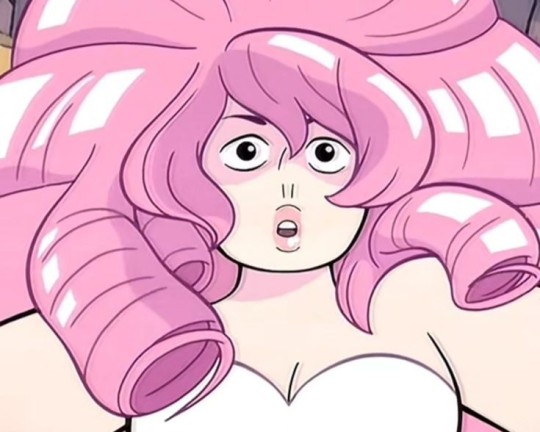
THIS IS ROSE AT THE START OF HER ARC
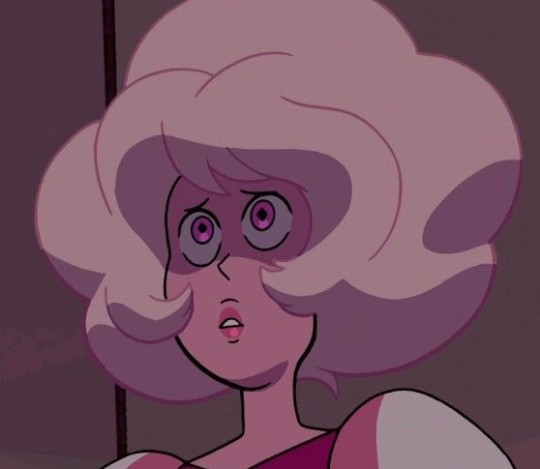
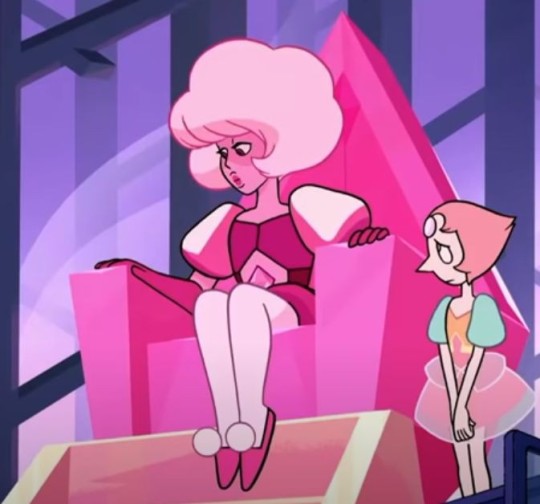
THIS DIRECTLY INVERTS HOW WE SEE STEVENS ARC
START
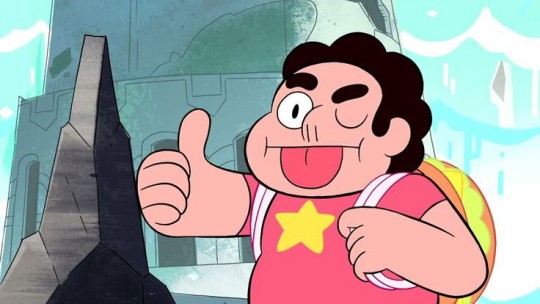
END
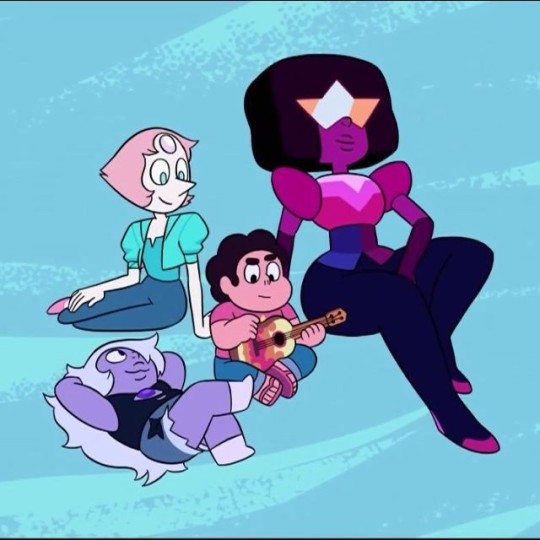
ROSE WAS NOT A VILLAIN. SHE WAS THE GOOD PERSON, WE THOUGHT SHE WAS AT THE START OF THE SHOW , BUT UNLIKE STEVEN SHE WAS FROM AN ABUSIVE HOUSEHOLD WHICH IMPACTED HER. Yes. She's a coward, but people need to understand that seeing rose as pink daimond rose WAS pink but went through her arc and became rose. Rose was originally a persona who she slowly became.
DAMN YOU REBECCA FOR WRITING SUCH AN INTERESTING CHARACTER.

#steven universe#su#cartoon network#rose quartz#rose quarts steven universe#character writing#rebecca sugar#character arcs#characterisation#rant post#rant
15 notes
·
View notes